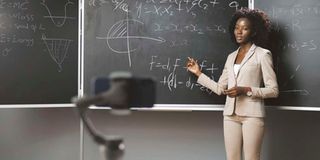Promote maths performance in high schools

Mathematics is at the centre of the career compass; the cornerstone of careers.
Mwalimu wa maths, hapa ni wapi?”—a mockery of rebuke by one’s mathematics teachers—is a hilarious antipathy that has gained unprecedented traction among Kenyans on social media platforms.
Though comic relief to many, it is a detestation that depicts how mathematics was a nightmare to many who could only afford dismal performance in high school. It also speaks to the defeatist attitude of many students towards the subject and the teachers’ ne’er-do-well perception of the learners.
Mathematics is at the centre of the career compass; the cornerstone of careers. The lucrative courses—medicine, nursing, pharmacy, natural sciences, finance and statistics, computer science, social sciences, education and engineering, to mention a few—require a stellar grade in it.
The conventional classification of cluster subjects has maths as the only irreplaceable subject. The four categories are maths, a language, a science and any other—humanities and technical subjects.
A tertiary college diploma or certificate from a technical and vocational education and training (TVET) institution in most areas of study will also require a good grasp of maths. To play the devil’s advocate, I would say, like the ‘maths teacher’, that a mediocre grade in the subject is self-sabotaging.
Maths ignites the power of logical reasoning, creativity, problem-solving, critical thinking, and spatial thinking and communication skills. At the bare minimum, it helps an entrepreneur to figure out their personal and business finance. Its practicability in real life is undeniable.
It is critical that the Ministry of Education and schools invest in promoting good performance in maths. Students should also seek to master timeless maths study hacks. They must not only read and attend class but also practise often, actively engaging in calculations as opposed to rote learning.
Numerous tests
Tutors must make learning student-centred by giving numerous tests and exercises to enable learning by discovery. Importantly, study maths in the morning hours, when the mind is fresh and unadulterated, and over the holidays.
Being orderly, organised and methodical and paying special attention to critical formulae and key terms such as “solve”, “simplify” and “construct” is key. Revisit previously studied concepts as some topics require application of knowledge from prerequisites such as Statistics I and II.
Sketching, especially in concepts that involve diagrams, gives one spatial thinking to make sense of the world for easier understanding. Common solids, volume, capacity, longitudes and latitudes require three-dimensional conceptualisation. Other study skills include making use of efficient study groups, completing assignments, asking questions, critiquing, studying in quiet places and doing chapter reviews and tests.
As students pursue an exciting future, they need to know mathematics is not expendable. Other stakeholders must also put in concerted efforts for the sake of the learner.
Mr Mwirichia is a high school teacher. [email protected].





